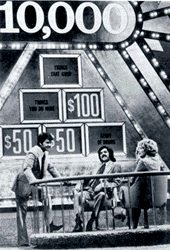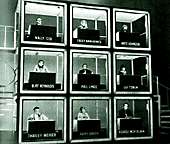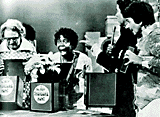
"Decline and Fall: Millionaires on T.V."
by NOELL CLAYBOURNE (c/o Gregory Avery)
I recently paid a visit to the sun-burned streets of Los Angeles when I was suddenly attacked by a nebulous virus---there seems to be a lot of them about in the U.S., and not just in the computer wires---and was thus laid low for several days in my Central Park West apartment, while the invaders burnt and charred their course and I was stoked to the gills on medication. I tried reading the new Joyce Carol Oates creation---"Death came flying", "Death came flitting", "Death came fleeting" and on and on---then attempted, and failed, to start the latest piece of tripe by one of our younger, less-than-luminous English writing lights. My hand found itself inexorably creeping towards the remote control. The television flared to life. And I found myself, in my state of malaise, watching what is supposed to be the most popular program on the airwaves.
 It
came swimming up through the dark,
like something Rimbaud would have
seen in his last days in Africa. The
drama played out on a set which looked
like something N.A.S.A. would have
built for training astronauts. Other
souls could be seen waving in the
stacked bleachers, as if roasting
in the Inferno. One is chosen and
steps forward, sits across from the
crepuscular host (who wears clothing
that is all of one color and shines,
like the page in a high-fashion magazine),
and has but one moment to relish his
lofty position before everything swings
into motion. The lights sweep around,
music screeches on the soundtrack
like harpies, and a question is posed.
"What color was the old grey mare?
Was it, a) purple, b) mauve, c) red,
or, d) none of the above?"
It
came swimming up through the dark,
like something Rimbaud would have
seen in his last days in Africa. The
drama played out on a set which looked
like something N.A.S.A. would have
built for training astronauts. Other
souls could be seen waving in the
stacked bleachers, as if roasting
in the Inferno. One is chosen and
steps forward, sits across from the
crepuscular host (who wears clothing
that is all of one color and shines,
like the page in a high-fashion magazine),
and has but one moment to relish his
lofty position before everything swings
into motion. The lights sweep around,
music screeches on the soundtrack
like harpies, and a question is posed.
"What color was the old grey mare?
Was it, a) purple, b) mauve, c) red,
or, d) none of the above?"
The contestant squirms and jars his memory. It is like being tortured on the rack. He has an option to call upon help from the audience, call upon help from some other, more exalted place, by telephone, or to have two of the four answers taken away, leaving one of the correct ones....
 I
do not attempt to pretend that I understood
all that was going on. Memories of
the spectacle---which appears on American
T.V. multiple times per week, like
the old "Peyton Place" series with
Mia Farrow---come back like jagged
shards of glass. There were moments
of exultation, as the contestant,
the Chosen One, gives correct answers
to the rubrics posed to him or her,
and inches, tier by tier, up the money
scale towards the sacred temporal
peak of One Million Dollars. (This
has actually been scaled and won,
so I am told, by more than one participant.)
At other times, people gave an incorrect
response, and found their hopes shattered
and their selves thrown down into
the dust from whence they sprang.
A devastating spectacle. And one that
I thoroughly enjoyed. What will such-and-such
do when they suddenly found that they
had gotten too cocky and blown their
big chance?
I
do not attempt to pretend that I understood
all that was going on. Memories of
the spectacle---which appears on American
T.V. multiple times per week, like
the old "Peyton Place" series with
Mia Farrow---come back like jagged
shards of glass. There were moments
of exultation, as the contestant,
the Chosen One, gives correct answers
to the rubrics posed to him or her,
and inches, tier by tier, up the money
scale towards the sacred temporal
peak of One Million Dollars. (This
has actually been scaled and won,
so I am told, by more than one participant.)
At other times, people gave an incorrect
response, and found their hopes shattered
and their selves thrown down into
the dust from whence they sprang.
A devastating spectacle. And one that
I thoroughly enjoyed. What will such-and-such
do when they suddenly found that they
had gotten too cocky and blown their
big chance?
After the inexorable commercial breaks,
the host makes small talk with the
burgeoning contestant in an effort
to throw more light on their origins.
 Various
significant others are mentioned and
pointed out, seated advantageously,
for the cameras at any rate, in the
bleachers behind. There is talk of
what they have done. There is talk
of what they will do, once they have
become filthy rich. Stunning scintillation.
Everyone wants to look like they are
at their absolute height on television
(a phenomenon not exclusive to the
western shores of the Atlantic). So
it was with perverse delight that
I avidly watched the contestants for
that moment when they took their misstep
and found their dreams come dangling
down. Most maintained their cool poise.
(Were they instructed and/or coached
to do this before the program was
recorded?) At least one became invariably
peeved, stalking off the set, with
its exposed, spidery chrome latticework
like a schoolchild being told to go
straightway to the headmaster's office
to receive punishment for an infraction,
although the gutta percha being not
the rule in the States, mental and
emotional torture must therefore serve
in its stead.
Various
significant others are mentioned and
pointed out, seated advantageously,
for the cameras at any rate, in the
bleachers behind. There is talk of
what they have done. There is talk
of what they will do, once they have
become filthy rich. Stunning scintillation.
Everyone wants to look like they are
at their absolute height on television
(a phenomenon not exclusive to the
western shores of the Atlantic). So
it was with perverse delight that
I avidly watched the contestants for
that moment when they took their misstep
and found their dreams come dangling
down. Most maintained their cool poise.
(Were they instructed and/or coached
to do this before the program was
recorded?) At least one became invariably
peeved, stalking off the set, with
its exposed, spidery chrome latticework
like a schoolchild being told to go
straightway to the headmaster's office
to receive punishment for an infraction,
although the gutta percha being not
the rule in the States, mental and
emotional torture must therefore serve
in its stead.
 But
why be gladdened by the spectacle
of other's downfall? Does some part
of me believe that they do not deserve
to be recipients of such wealth? I
pondered this question while winging
my way back to London, tapping out,
on my laptop computer, something about
the passing of dear Sir John to be
published at the forthcoming Venice
festival, where his last film appearance
is to be shown. There, amid the upper
stratosphere and the limitless clouds,
I was reminded of my corrida-like
experiences and flirtations with the
television medium, which has been,
and always will be, a strange and
perilous place. Sir John had once
told me that you should go into television
only if you absolutely needed the
money.
But
why be gladdened by the spectacle
of other's downfall? Does some part
of me believe that they do not deserve
to be recipients of such wealth? I
pondered this question while winging
my way back to London, tapping out,
on my laptop computer, something about
the passing of dear Sir John to be
published at the forthcoming Venice
festival, where his last film appearance
is to be shown. There, amid the upper
stratosphere and the limitless clouds,
I was reminded of my corrida-like
experiences and flirtations with the
television medium, which has been,
and always will be, a strange and
perilous place. Sir John had once
told me that you should go into television
only if you absolutely needed the
money.
(Noell Claybourne has acted, written and directed for the stage and screen over the course of his 60-year career. He has won numerous awards, and has twice been the recipient of the prestigious Booker Prize. He divides his time between his home in London and the U.S.)